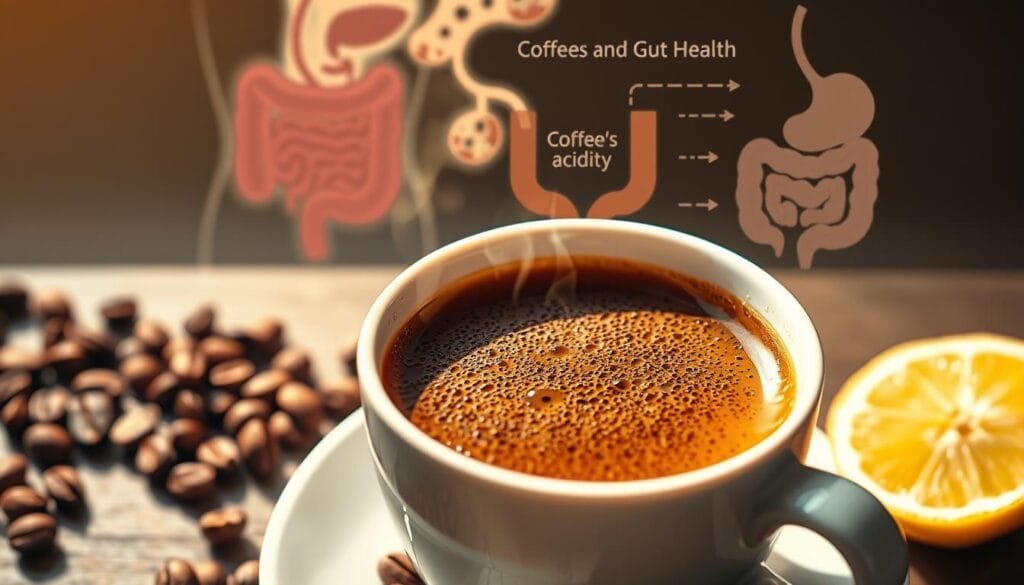Currently Empty: RM0.00
Many people start their day with a warm cup of coffee, but few realize its potential effects on their digestive wellness. Recent research sheds light on how this popular beverage interacts with the gut microbiome, the complex community of bacteria living in our digestive tracts.
A groundbreaking study by ZOE analyzed over 22,800 participants across 25 countries. The findings revealed that regular drinkers had significantly higher levels of L. asaccharolyticus, a beneficial bacterium linked to gut balance. This suggests a fascinating connection between daily intake and microbial diversity.
Scientists attribute these effects to natural compounds like polyphenols, which act as antioxidants. These substances may promote the growth of helpful bacterial species while supporting overall digestive function. However, moderation remains key, as excessive consumption could lead to unwanted side effects.
Key Takeaways
- Large-scale research shows coffee drinkers have more beneficial gut bacteria.
- Polyphenols in the beverage may support microbial growth.
- Results were consistent across diverse global dietary patterns.
- Moderation helps maximize benefits while minimizing risks.
- Individual responses may vary based on unique microbiome composition.
Understanding the Gut Microbiome and Coffee’s Role
Deep within our bodies thrives a hidden world of microorganisms influenced by dietary choices. This ecosystem, known as the gut microbiome, contains over 100 trillion bacteria, viruses, and fungi working in harmony. It plays vital roles in digestion, immune function, and even mental well-being.
What Makes the Gut Microbiome Unique?
The microbiome acts like a fingerprint—each person’s bacterial mix is distinct. Studies show it responds swiftly to food and drinks, with coffee standing out. The ZOE project analyzed 150+ foods and found the strongest microbiome link with this popular beverage.
Unlike culturally variable foods, coffee maintains consistent chemical properties worldwide. Its 2,000+ natural compounds, including polyphenols, create a unique environment for microbial growth. Decaf versions show similar effects, hinting at non-caffeine mechanisms at play.
Why Focus on Coffee’s Impact?
Daily consumption patterns make coffee ideal for research. Scientists describe microbiome interactions as a “biological cacophony” needing decoding. Understanding its effects could unlock broader diet-microbe relationships.
Key insights from global research:
- Regular drinkers host more beneficial bacteria like L. asaccharolyticus.
- Polyphenols may reduce inflammation while feeding microbial diversity.
- Findings apply across diverse diets, from Mediterranean to Asian cuisines.
Is Coffee Good for Gut Health? The Science Behind It
Laboratory evidence now confirms what ancient traditions suggested about popular beverages. Cutting-edge research identifies 115 bacterial species that respond to routine intake patterns. This discovery reshapes our understanding of dietary impacts on internal ecosystems.
Breakthrough Findings from Global Studies
Among all observed microorganisms, L. asaccharolyticus shows the most dramatic response. Regular drinkers host 6-8 times more of this beneficial strain compared to non-consumers. In controlled lab tests, specific compounds stimulated its growth within hours.
Two metabolic markers stand out in frequent consumers:
- Elevated quinic acid levels from chlorogenic acid conversion
- Higher hippurate concentrations indicating gut balance
These changes suggest enhanced microbial activity supporting overall wellness. Interestingly, decaffeinated versions produced similar effects, pointing to non-stimulant mechanisms.
Validating the Research
Machine learning models accurately predicted consumption habits solely from microbiome data. This held true across 25 countries’ dietary patterns, confirming universal biological responses.
However, scientists note these observational studies show correlation rather than causation. Further clinical trials will explore whether these microbial changes directly create health benefits.
The findings open new avenues for understanding how everyday choices influence our microscopic partners. As research progresses, we gain clearer insights into optimizing digestive ecosystems through simple dietary adjustments.
Positive Effects of Coffee on Gut Health
Modern science reveals unexpected allies in maintaining digestive wellness. Among them, the humble cup of joe stands out for its surprising benefits to microbial balance. Researchers credit its natural compounds for fostering a thriving internal ecosystem.
Boosting Beneficial Bacteria
Polyphenols in this popular beverage act like fuel for helpful bacteria. These compounds resist digestion, reaching the colon intact to feed strains like L. asaccharolyticus. Studies show drinkers host richer microbial diversity compared to non-consumers.
Quinic acid, a byproduct of metabolism, demonstrates antiviral properties. It may lower risks for metabolic disease while supporting gut health. Hippurate levels, another marker, correlate with improved metabolic function.
Anti-Inflammatory and Antioxidant Benefits
The drink’s properties extend beyond bacterial growth. Polyphenols reduce intestinal inflammation, shielding the gut lining from damage. Antioxidants combat oxidative stress, which contributes to chronic conditions.
Regular consumption at moderate levels (3–5 cups daily) links to:
- Enhanced bowel motility
- Liver-gut axis support
- Prebiotic effects rivaling specialized supplements
For maximum benefits, experts recommend black varieties to preserve polyphenol content. This simple adjustment amplifies its impact gut ecosystems positively.
Potential Downsides of Coffee for Your Gut
While coffee offers numerous benefits, it’s important to consider its potential drawbacks on digestive wellness. High acid content may trigger discomfort, and excessive intake can disrupt microbial balance. Understanding these effects helps tailor consumption for optimal results.

Acidity and Irritation
The natural acids in coffee stimulate gastric juice production, which may lead to heartburn or gastritis in sensitive individuals. Those with conditions like GERD often report worsened symptoms after drinking coffee.
Individual tolerance varies—some experience immediate reflux, while others adapt over time. Cold brew or low-acid varieties may reduce irritation without sacrificing flavor.
Overconsumption and Imbalance
Beyond 3–5 cups daily, benefits plateau and risks emerge. Excessive caffeine can:
- Trigger anxiety or sleep disturbances
- Impair nutrient absorption (e.g., iron and calcium)
- Disrupt gut bacteria diversity with added sugars
For IBS/IBD patients, even moderate amounts may exacerbate symptoms. Monitoring personal thresholds ensures coffee supports—rather than strains—digestive health.
How to Enjoy Coffee for Optimal Gut Health
Getting the most from your daily brew requires smart choices about type, timing, and preparation. These simple adjustments help maximize digestive benefits while keeping potential drawbacks in check.
Choosing the Right Coffee
Quality beans make all the difference. Organic varieties contain 23% more polyphenols—key compounds that feed beneficial bacteria. Dark roasts and cold brew options reduce acidity by 67%, making them gentler on sensitive stomachs.
Storage matters too. Keep beans airtight and away from light to preserve antioxidant content. For those sensitive to caffeine, decaffeinated versions offer similar microbiome benefits without stimulation.
Moderation and Timing
Research suggests 1-3 cups per day strikes the ideal balance. This amount provides enough chlorogenic acid to support microbial diversity without overwhelming the system.
Morning and midday consumption align best with natural cortisol rhythms. Avoiding late afternoon intake prevents sleep disruption, which indirectly affects gut health.
Smart pairing enhances benefits:
- Combine with prebiotic foods like bananas or oats
- Use plant-based milk instead of refined sugars
- Allow to cool slightly to protect gut lining
These practices transform routine consumption into a gut-friendly habit. Listen to your body’s signals and adjust accordingly for personalized benefits.
About Wellness Concept
Navigating digestive wellness requires expert guidance, and Wellness Concept delivers just that. As Malaysia’s leading specialists in microbial balance, they combine science-backed strategies with personalized care.

Their team of certified nutritionists designs tailored plans to optimize digestive function. From initial assessments to follow-ups, clients receive evidence-based advice aligned with their unique needs.
Business Hours
Wellness Concept welcomes consultations during these hours:
- Weekdays: 9:30 AM – 6:30 PM (Mon-Fri)
- Weekends: 10:00 AM – 5:00 PM (Sat-Sun)
Contact Us
Reach their experts via WhatsApp at +60123822655 for immediate queries. Clinics in Kuala Lumpur and Penang offer in-person visits, with insurance partnerships for seamless payments.
“Every gut tells a different story—our job is to listen and guide.”
Booking follow-up consultations ensures continuous support. Whether addressing bloating, food sensitivities, or long-term balance, Wellness Concept prioritizes sustainable results.
Conclusion
Emerging research paints a clear picture about daily rituals and digestive wellness. Moderate coffee consumption shows net positive effects on gut health, particularly through microbial diversity support.
Individual biology determines ideal intake levels. What works for one person may differ for another. Self-experimentation helps find the sweet spot between enjoyment and wellness.
Future studies will clarify causal relationships between drinking coffee and microbiome changes. Until then, current evidence suggests thoughtful consumption offers more benefits than risks for most people.
Wellness Concept stands ready to help Malaysians navigate these personalized choices. Their experts tailor recommendations to unique digestive profiles, turning science into actionable steps for better living.
FAQ
Does drinking coffee affect gut bacteria?
Yes, research suggests that moderate consumption can promote beneficial microbes like Bifidobacteria while reducing harmful strains.
Can decaffeinated coffee improve digestion?
Decaf contains polyphenols and chlorogenic acid, which may support microbial diversity without caffeine’s stimulating effects.
How much should someone drink daily for gut benefits?
Studies indicate 2–3 cups per day balances positive impacts without overstimulating acid production or disrupting balance.
Are there specific compounds in coffee that aid gut health?
Polyphenols and fiber-like molecules act as prebiotics, fueling healthy bacteria growth while offering antioxidant properties.
Could excessive intake harm the microbiome?
Overconsumption may increase acidity or irritate the digestive tract, so moderation is key for maintaining harmony.
What’s the best time to drink it for digestive wellness?
Consuming it with meals may buffer acidity, while avoiding late-day intake helps prevent sleep disruption linked to gut imbalances.



